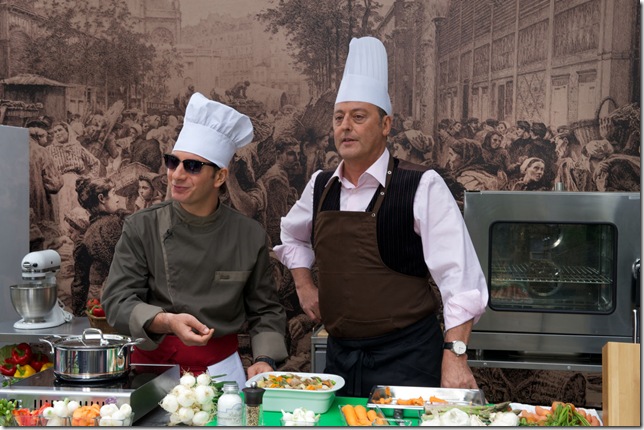So let’s recap: Jon Favreau’s Chef is about an egotistical, professionally embattled toque (Favreau himself) who feuds with his restaurant’s owner and is forced to forge a new culinary path while repairing a broken relationship with his only child. Daniel Cohen’s Le Chef, meanwhile, is about an egotistical, professionally embattled toque (Jean Reno) who feuds with his restaurant’s owner and is forced to forge a new culinary path while repairing a broken relationship with his only child.
It seems predestined that Cohen’s French cinematic soufflé — which was actually completed in 2012, before Favreau’s foodie movie — will find its box office numbers to be undercooked. Le Chef opens in South Florida on Friday, at a time when Chef is continuing to expand its theatrical footprint and generate buzz: Such are the vagaries of foreign-film distribution.
But, for all their similar charms and similar faults — namely, that the delectable filmed food isn’t as appetizing as the conventional narrative structure — I was ultimately more satiated by Cohen’s import. Nothing beats the first half-hour of Favreau’s movie, with its accurate depiction of a big-city restaurant meltdown, but Le Chef ultimately has more on its plate. Its themes about managing life’s priorities, learning one’s value, and the necessity of reinvention — ideas arrived through sentimental contrivances in Chef — are handled with a greater degree of plausibility here.
Le Chef is really about two gastronomic worlds colliding, each with everything to lose and everything to gain. Alexandre Lagarde (Jean Reno), a veteran three-star chef with his own television show and namesake restaurant, is quickly being pushed out by his restaurant group’s malicious owner, Stanislas (Julien Boisselier). His dishes have become uninspired, so says Stanislas, who warns Alexandre that if he loses one of his stars, his ouster is imminent, and the restaurant will change its vision.
As movie luck has it, he comes into contact with Jacky Bonnot (Michaël Youn), a young culinary aesthete who has been fired from four restaurant jobs in a row because he couldn’t deal with the customers’ proletarian tastes. Jacky has a girlfriend and a child on the way, and Alexandre discovers him working in maintenance for an assisted-living facility, his first steady job in some time — which he promptly gives up to join Alexandre in an unpaid internship, an inconvenient fact he tries to keep from his wife (Raphaëlle Agogué).
This is a shaggy-chef story that doesn’t take too many surprising turns, but navigates its predictable redemption narrative with, mostly, good humor and class. The highlight of the movie is its hilarious mid-film foray into molecular cuisine, a pretentious foodie trend it gently but effectively skewers, from “liquid nitrogen champagne” to a glass of wine made without grapes or alcohol.
None of this excuses the movie’s ill-fated descent into offensive cultural stereotypes, most explicitly the bit of risible folderol in which Alexandre and Jacky visit a competing restaurant in the disguise of cultural attachés from an Asian country. With Alexandre’s Fu Manchu facial hair and Jacky’s kimono and chalk-white makeup, they look every bit like extras in a Mizoguchi period piece as interpreted by Martin and Lewis, and it has no place in Cohen’s film. The same goes for the ridiculous cameo from a specialist in molecular cooking — a mercurial Spaniard who is unfortunately introduced with a soundtrack of flamenco guitar music.
You could argue that most of the movie is of a similar ludicrous caliber, but I found it more moving than it initially seems, boxing its characters into difficult moral and ethical choices whose results are genuinely gratifying. Le Chef is not always a perfect movie to swallow, but it has a pleasant aftertaste.
LE CHEF. Director: Daniel Cohen; Cast: Jean Reno, Michaël Youn, Raphaëlle Agogué, Julien Boisselier; Distributor: Cohen Media Group; Rating: PG-13; in French with English subtitles. Opens: Friday at Regal Shadowood 16 in Boca Raton and the Tower Theater in Miami.
